“Whooosh!” Hao Qingguang flung a self-made firebomb from the roof with all his strength at a mob of 50 or 60 thugs, knowing it couldn’t hold them for long. Under his feet was what was left of his home—a 639-year-old complex that the gang was trying to pull down.
The building was home to Hao’s ancestor Hao Yixing, a renowned scholar some 400 years ago in the Qing Dynasty. Having survived quite a few wars, periods of unrest, and disasters, the house was now partly demolished by a giant excavator that showed up unannounced at 6:30 a.m. on May 6, 2010.
The gang that showed up with it smashed the doors and windows with shovels, machetes, and clubs. Gangsters tied up the residents who tried in vain to flee the tear-gassed house.
This is no action movie. This was a real scene in a village called Chengguan, in China’s east-coastal Shandong Province. Forced eviction and violent demolitions executed by legal-enforcement departments as well as armed gangsters are common components in the nation-wide frenzy of field-clearing for real-estate projects planned and executed by local governments.
Residents who are unwilling to move due to unfair compensation or other reasons are referred to as “ding zi hu,” literally translated as “nail households.” The authorities stop at nothing to pull out these “nails.” Violent conflicts like this one are becoming more frequent and intense.
Hao Qingguang is among the most determined “nails” because for centuries, the house has been a witness of the family’s glories. He and his family guarded their home with firebombs, but their opponents outnumbered them and were better-equipped.
“They had shifts of 20 to 30 people to attack us 24 hours a day,” said Hao Qingli, Hao’s sister. “They threw rocks, fireworks, and firebombs at us and burned down part of the building.”
A final attack on May 11 ended the confrontation. The gang shot the family members on the roof with rifles, injuring two.
“The bullet hit me in the eye, and I still can’t see clearly now,” Hao Qingli told The Epoch Times. “My brother Qingguang was burnt by a petrol bomb.” The gang then robbed the house before they pulled it down completely.
The value of the Hao’s lost property is estimated at around 1 million yuan (approximately US$147,500). In addition, they also lost two original royal edicts issued by Qing Dynasty’s Emperor Daoguang and two ink stones that belonged to Hao Yixing, the scholar, all invaluable treasures passed down through the generations.
Almost every one of the village’s 400 or so residents was driven away by force. The local authorities started to empty the village in July 2009 when a real-estate developer proposed to purchase the land for a residential building project. After the deal was made, the authorities immediately cut the village’s power and water supply, and damaged some main roads to the village.
Villagers said that the compensation was not calculated according to regulations, and different standards were applied in favor of the village leaders’ families and friends. The villagers who appealed waited for the authorities’ feedback until more than 20 households were attacked and robbed by gangsters in January 2010. When questioned, village leaders said it was nothing but the villagers’ bad luck.
Officials from a higher level of government came to the village in March and promised to persuade the local authorities to agree to fair compensations, the villagers said. But eight days later, a household was burned down, then two others. The police concluded they were arsons, but no further investigation was made.
The villagers are still trying to protect the ruins of what used to be their home, but they do not know whom to turn to. They knew they had little chance to win by fighting with the regime, which controls the legal system and law-enforcement forces.
In recent years, local officials in China have sold more land than ever to meet the central government’s goal of an 8 percent GDP increase. In 2009, the land-sale revenue of local governments reached 1.59 trillion yuan (US$233 billion), representing more than a 60 percent increase from 2008, according to the Chinese state-run Xinhua.com.
Government projects are another major cause of forced evictions. Construction for the Beijing Olympic Games and the recent World Expo evicted 6,037 and about 18,000 households, according to China’s official data, while experts abroad say the actual numbers are much higher.
Compensation disputes are very common due to loose regulation and prevalent corruption at all government levels, but the authorities do not wait for negotiations. They frequently resort to violence and summon or hire local gangs to terrorize the residents, forcing them to leave. Many petitioners who appealed over forced eviction and unjust compensation have been suppressed by measures that include arrest, house arrest, and physical abuse.
“The forced eviction by the authorities has fully demonstrated the leaders’ determination to rebuild our beautiful city,” a Chengguan villager screen-named Yongshi wrote satirically in a blog.
“Harmony [a political slogan of the Hu Jintao government] appears only after storms. This perfect forced-eviction did not kill a single person. What great harmony it is!”
Read the original Chinese article: http://epochtimes.com/gb/10/7/13/n2964927.htm
The building was home to Hao’s ancestor Hao Yixing, a renowned scholar some 400 years ago in the Qing Dynasty. Having survived quite a few wars, periods of unrest, and disasters, the house was now partly demolished by a giant excavator that showed up unannounced at 6:30 a.m. on May 6, 2010.
The gang that showed up with it smashed the doors and windows with shovels, machetes, and clubs. Gangsters tied up the residents who tried in vain to flee the tear-gassed house.
This is no action movie. This was a real scene in a village called Chengguan, in China’s east-coastal Shandong Province. Forced eviction and violent demolitions executed by legal-enforcement departments as well as armed gangsters are common components in the nation-wide frenzy of field-clearing for real-estate projects planned and executed by local governments.
Residents who are unwilling to move due to unfair compensation or other reasons are referred to as “ding zi hu,” literally translated as “nail households.” The authorities stop at nothing to pull out these “nails.” Violent conflicts like this one are becoming more frequent and intense.
Hao Qingguang is among the most determined “nails” because for centuries, the house has been a witness of the family’s glories. He and his family guarded their home with firebombs, but their opponents outnumbered them and were better-equipped.
“They had shifts of 20 to 30 people to attack us 24 hours a day,” said Hao Qingli, Hao’s sister. “They threw rocks, fireworks, and firebombs at us and burned down part of the building.”
A final attack on May 11 ended the confrontation. The gang shot the family members on the roof with rifles, injuring two.
“The bullet hit me in the eye, and I still can’t see clearly now,” Hao Qingli told The Epoch Times. “My brother Qingguang was burnt by a petrol bomb.” The gang then robbed the house before they pulled it down completely.
Invaluable Treasures
The value of the Hao’s lost property is estimated at around 1 million yuan (approximately US$147,500). In addition, they also lost two original royal edicts issued by Qing Dynasty’s Emperor Daoguang and two ink stones that belonged to Hao Yixing, the scholar, all invaluable treasures passed down through the generations.
Almost every one of the village’s 400 or so residents was driven away by force. The local authorities started to empty the village in July 2009 when a real-estate developer proposed to purchase the land for a residential building project. After the deal was made, the authorities immediately cut the village’s power and water supply, and damaged some main roads to the village.
Villagers said that the compensation was not calculated according to regulations, and different standards were applied in favor of the village leaders’ families and friends. The villagers who appealed waited for the authorities’ feedback until more than 20 households were attacked and robbed by gangsters in January 2010. When questioned, village leaders said it was nothing but the villagers’ bad luck.
Officials from a higher level of government came to the village in March and promised to persuade the local authorities to agree to fair compensations, the villagers said. But eight days later, a household was burned down, then two others. The police concluded they were arsons, but no further investigation was made.
The villagers are still trying to protect the ruins of what used to be their home, but they do not know whom to turn to. They knew they had little chance to win by fighting with the regime, which controls the legal system and law-enforcement forces.
State-Sponsored Violence
In recent years, local officials in China have sold more land than ever to meet the central government’s goal of an 8 percent GDP increase. In 2009, the land-sale revenue of local governments reached 1.59 trillion yuan (US$233 billion), representing more than a 60 percent increase from 2008, according to the Chinese state-run Xinhua.com.
Government projects are another major cause of forced evictions. Construction for the Beijing Olympic Games and the recent World Expo evicted 6,037 and about 18,000 households, according to China’s official data, while experts abroad say the actual numbers are much higher.
Compensation disputes are very common due to loose regulation and prevalent corruption at all government levels, but the authorities do not wait for negotiations. They frequently resort to violence and summon or hire local gangs to terrorize the residents, forcing them to leave. Many petitioners who appealed over forced eviction and unjust compensation have been suppressed by measures that include arrest, house arrest, and physical abuse.
“The forced eviction by the authorities has fully demonstrated the leaders’ determination to rebuild our beautiful city,” a Chengguan villager screen-named Yongshi wrote satirically in a blog.
“Harmony [a political slogan of the Hu Jintao government] appears only after storms. This perfect forced-eviction did not kill a single person. What great harmony it is!”
Read the original Chinese article: http://epochtimes.com/gb/10/7/13/n2964927.htm
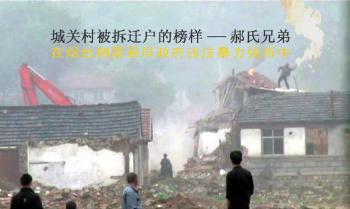
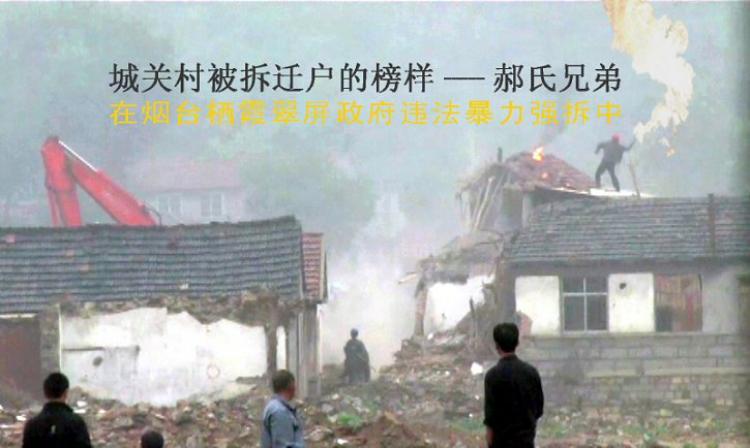
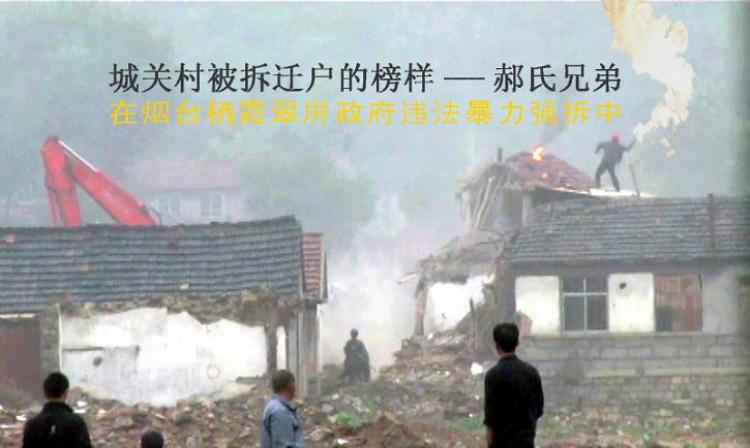
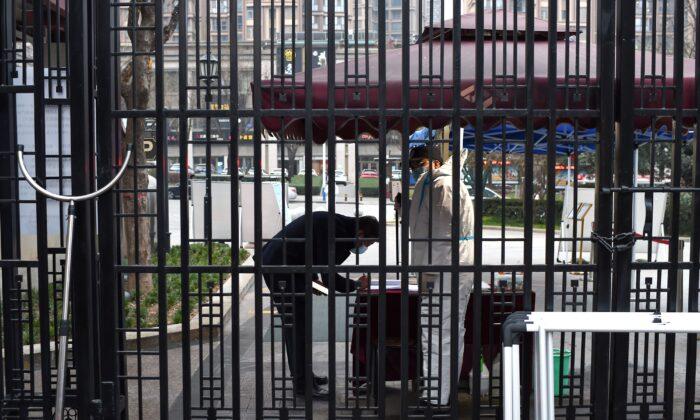


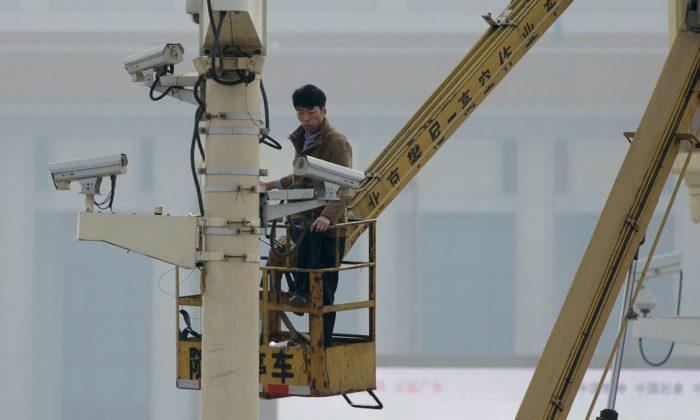
Friends Read Free